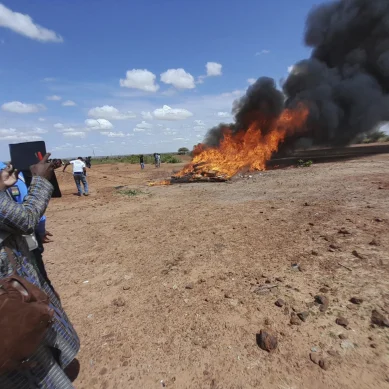
When concerns are raised about the environmental justice in Uganda, the question is often implicitly asking whether environment itself matters anymore in a country that once prided itself as the Pearl of Africa.
Nature gave it the tag that bespoke of ecological symbiosis. Environment and justice – whether human or community justice, animal and plant justice, or even ecosystem justice are covered by the question.
Once environment is destroyed, environmental justice, and indeed all the other types of justice are violated. But this topic is on environmental justice in its entirety.
There has been widespread environmental injustice in the last three and a half decades, and there is little hope that the destruction will decline. The main reason environmental destruction has been rising in decades and between decades is because of President Tibuhaburwa Museveni’s philosophy of development.
The president believes that for development to take place in Uganda, infrastructure development (which he sees as the only development) must come before nature, environment and people – therefore, social development must come last. He is unaware that there is what we call environmental development (i.e development which puts environment at the centre of all development).
Environmental development is multidimensional, with dimensions such as cultural, social, moral, spiritual, ecological, ethical and psychological – all being mutually integrated and inclusive.
As I pointed out a long time ago, and others have observed, perceptions of the term environment differ from one society to another. For the vast majority of Africans, particularly the very poor, it is a question of survival. In fact, it is a development tool. If environment is left out of development, then whoever is pursuing development is chasing a mirage. He or she may end up viewing buildings in form of factories, skyscrapers, supermarkets and mansions, or huge dams as the only parameters used to measure development. Yet these are like rocks in a desert, which produce nothing.
Environment is productive and tends to balance production and waste if left in its natural state.
The truth is that when you pursue development as conquest of Nature, you end up conquering yourself and many other beings that derive their livelihoods from its productivity. Environment and survival cannot be delinked. When environment collapses, survival also collapses, and it becomes difficult to adapt to the new environmental conditions.
As I used to tell my students of environmental science, environmental management, environmental planning and management, biological conservation and ecology, in the 1990s and early Millennium, environment should be viewed as consisting of three human-oriented dimensions: the ecological/biological; the socio-cultural, and the socio-economic. There is also a non-human-oriented dimension: the temporal dimension.
The dimensions are not mutually exclusive but mutually inclusive and are interconnected and interpenetrate each other. All the problems, issues and challenges of environment and development can be assigned to these dimensions. It would be environmentally-literate for policy-makers, lawmakers and governors to take this categorisation of the environment in account when pursuing development and order, otherwise they will manifest more and more as enemy number one of the environment and humanity. Their policies, laws and actions will erode environmental integrity and prevent meaningful and effective development taking place, because they will tend to be techno-mechanistic in their perception of the environment and actions therein.
So, we can now repeat the question: “Does environmental justice matter anymore in Uganda?” Some Ugandans will respond positively and others will respond negatively. Those who will respond positively will have in their minds the many environmental policies and laws that exist to protect and conserve the environment. They will cite the efforts being taken to protect and conserve the environment. They will say there is even a ministry of environment and water. They will be right to a certain extent, in that they will be stressing the ecological-biological (physical) perspective of the environment, at the exclusion of the other dimensions of the environment (i.e., the social cultural, the socioeconomic and the temporal). A holistic definition of environment must include all its dimensions.
A definition that excludes all the dimensions of the environment allows for continued abuse `of the environment intellectually and practically. By abusing the environment, they will be abusing the environmental justice of those who depend on the environment directly for survival. The environmental justice will be abused in all dimensions of the environment.
In the ecological-biological dimension of the environment, we in Uganda are witnessing more and more land grabbing where we used to see our people engage in highly productive bioecological farming, which was socioculturally sensitive to the survival of our indigenous people.
Forests, swamps and freshwater lakes are being destroyed by greedy and selfish people whose minds are focused only on money making and primitively accumulating wealth as much as they can. This is being exacerbated by government’s choice of building money economy at the expense of more environmentally-sensitive human energy systems typical of our indigenous groups of people.
In virtually all of Uganda, lakes, forests and indigenous human energy systems are being destroyed in favour of oil palm growing, sugarcane growing or oil drilling. Human, animal and plant communities have been displaced and the people converted into refugees in their own homes, who without land are now non-productive locally, or have streamed into towns and cities in search of survival, yet there is no survival there.
However, while there, they constitute a pool of cheap labour that can be easily hired and fired by the foreign investors, who are – predictably – Indians and Chinese, or some local people who are increasingly closely-related ethnically and kinship.
The interconnections between environment, culture and spirituality are more or less being permanently destroyed. In their paper “The struggle for Environmental justice in Uganda”, which is published on Reaserchgate.com Oweyegha-Afunaduula and Isaac Afunaduula wrote:
“Environment, culture and spirituality, at least in the case of the indigenous group called Basoga, is intricately interrelated, interdependent and interconnected and that the three tend to seek and nurture positive synergy where this status quo is respected. They argued that the struggle for environmental justice must seek to retain the unity between these aspects (environment, culture and spirituality) of nature. Focusing on the Basoga, they suggested that (i) future development in the Nile Basin must respect the environmental, cultural and spiritual endowment of the indigenous group, without which it is impossible to speak of true development; and (ii) To the Basoga this is environmental justice or sustainable development indeed”.
They add, “Culture makes environment and environment makes culture. Therefore, a reciprocal relationship exists between the two. This means that struggles for environmental justice must incorporate both the cultural and spiritual dimension if they are to be successful. It also means that the broad field of environment and development is empty without due consideration of the cultural and spiritual dimensions”.











